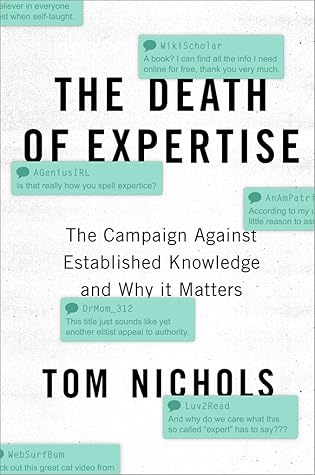More on this book
Community
Kindle Notes & Highlights
Read between
June 16, 2020 - February 28, 2023
People don’t just believe dumb things; they actively resist further learning rather than let go of those beliefs. I was not alive in the Middle Ages, so I cannot say it is unprecedented, but within my living memory I’ve never seen anything like it.
This makes it all the harder for experts to push back and to insist that people come to their senses. No matter what the subject, the argument always goes down the drain of an enraged ego and ends with minds unchanged, sometimes with professional relationships or even friendships damaged. Instead of arguing, experts today are supposed to accept such disagreements as, at worst, an honest difference of opinion.
In the case of vaccines, for example, low rates of participation in child vaccination programs are actually not a problem among small-town mothers with little schooling. Those mothers have to accept vaccinations for their kids because of the requirements in the public schools. The parents more likely to resist vaccines, as it turns out, are found among educated San Francisco suburbanites in Marin County. While these mothers and fathers are not doctors, they are educated just enough to believe they have the background to challenge established medical science. Thus, in a counterintuitive irony,
...more
This phenomenon is called “the Dunning-Kruger Effect,” named for David Dunning and Justin Kruger, the research psychologists at Cornell University who identified it in a landmark 1999 study. The Dunning-Kruger Effect, in sum, means that the dumber you are, the more confident you are that you’re not actually dumb. Dunning and Kruger more gently label such people as “unskilled” or “incompetent.” But that doesn’t change their central finding: “Not only do they reach erroneous conclusions and make unfortunate choices, but their incompetence robs them of the ability to realize it.”2 In fairness to
...more
People do not come to the Internet so that their bad information can be corrected or their cherished theories disproven. Rather, they ask the electronic oracle to confirm them in their ignorance. In 2015 a Washington Post writer, Caitlin Dewey, worried that fact-checking could never defeat myths and hoaxes because “no one has the time or cognitive capacity to reason all the apparent nuances and discrepancies out.”3 In the end, she sighed, “debunking them doesn’t do a darn thing.” Two months after she wrote those words, Dewey and the Post threw in the towel and ceased her weekly “what was fake
...more


